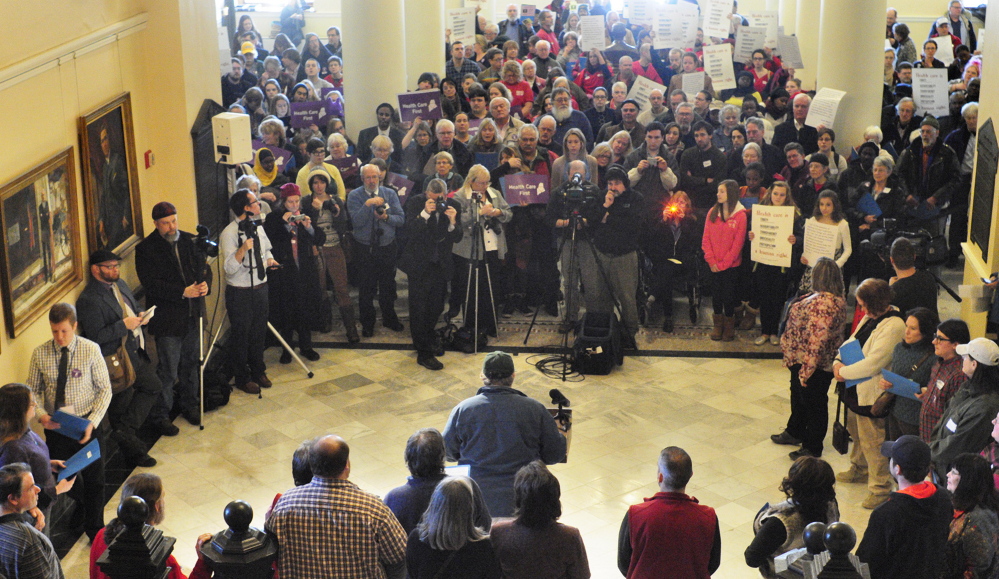On Nov. 7, Maine voters will decide some critical questions. There will be no candidates on the state ballot, but decisions will be made on Medicaid expansion in Maine, a proposed new casino in York County, and two bond issues.
Medicaid expansion, Question 2 on the ballot, is highly controversial. Gov. Paul LePage is a strong opponent and includes defeat for this question as part of his campaign for welfare reform. The actual ballot question will read, “Do you want Maine to expand Medicaid to provide healthcare coverage for qualified adults under age 65 with incomes at or below 138% of the federal poverty level, which in 2017 means $16,643 for a single person and $22, 412 for a family of two.”
Let’s review the background of Obamacare and Medicaid in Maine.
Medicaid is a federal program providing medical insurance to low-income people and individuals with disabilities. Maine’s Medicaid program is known as MaineCare. The Affordable Care Act, or Obamacare, provided for expansion of Medicaid to cover all individuals with incomes up to 138 percent of the federal poverty level. A 2012 Supreme Court ruling (NFIB v. Sebelius) had the practical effect of making Medicaid expansion optional for states. In 2018 the federal government will finance 94 percent of state Medicaid expansion. Starting in 2020 the feds will cover 90 percent of expansion costs. Nineteen states including Maine have chosen not to expand Medicaid.
Here in Maine, LePage has vetoed legislation to expand Medicaid under the ACA five times. Mainers for Health Care, known as “Yes on 2,” leads the campaign for a yes vote.
Let’s examine some of the pro and con arguments in the limited space available.
Mainers for Health Care, in support of Question 2, say “federal funds were earmarked for Maine three years ago that would provide health insurance to 70,000 Mainers by expanding Medicaid coverage. The Maine Legislature passed legislation five times to put these federal funds to work for Maine. The governor has vetoed each bill without a true understanding of the implications. No one should be blocked from accessing affordable health insurance, especially when so many need care or medicine and there are simple ways to improve the system. Expanding access to Medicaid is a common sense move that will improve health, create 3,000 jobs throughout the state and help preserve Maine’s community hospitals and health centers that so many of us depend on.”
The opposition is led by LePage; former DHHS Commissioner Mary Mayhew, now a candidate for governor; the Maine Republican Party; and “Welfare to Work.”
From the Maine Republican Party: “The Affordable Care Act (Obamacare) is likely to be repealed or changed. We are likely witnessing the introduction of a referendum that would have no effect other than misguided demands that Maine taxpayers would be saddled with, and potentially, even more welfare costs. The easiest way to explain this stunt is that Democrats are basically selling tickets on the Titanic as it sinks.”
Mayhew says, “A bloated Medicaid system means fewer resources for Maine’s most vulnerable citizens — our elderly and disabled. When MaineCare is running $50 million to $100 million shortfalls it hinders the state from making investments in other key priorities, such as our infrastructure, law enforcement, economic development or lowering Maine’s uncompetitive tax rates for businesses and individuals.”
Let’s sum it up. Since the Republicans, who control the Congress and the presidency, have now twice failed to repeal and replace the ACA, there is no indication that federal funds available for Medicaid expansion in Maine will become unavailable. Meanwhile, failure by Maine to accept 94 percent funding help, while other states get this money, looks like an unwise financial decision.
But the biggest argument in favor of accepting the federal assistance to MaineCare, as Republican U.S. Sen. Susan Collins has pointed out, is that it would protect the safety net for our most vulnerable citizens and avoid denial of health insurance coverage for thousands of Maine’s most needy.
We should enforce our welfare rules, but not at the expense of those who for no fault of their own need and deserve a helping hand to survive. I suspect that even those of us who support welfare reform will vote with our hearts as well as our heads on this one.
Vote yes on Question 2.
Don Roberts is a veteran broadcaster, writer and political consultant. He has served Augusta as a city councilor at-large, charter commission vice chairman and utilities district treasurer.
Send questions/comments to the editors.



Comments are no longer available on this story